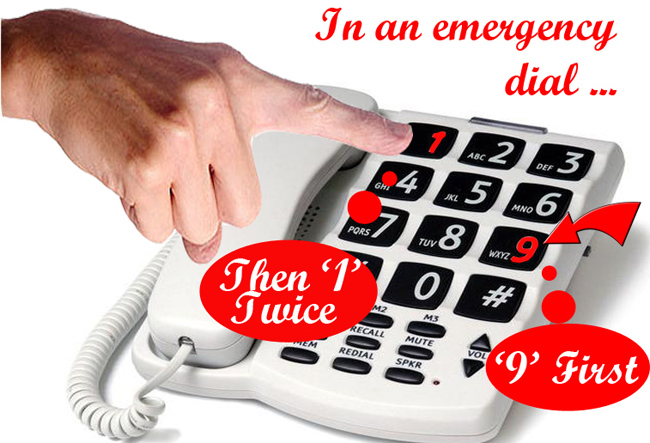It is estimated that on the average, every individual in the U.S. or Canada will call for emergency assistance at least twice during their lifetime. Because of this it is imperative to make sure you are prepared if and when the situation arrives that you need to dial 9-1-1.
What to Expect When You Call 9-1-1
When calling 9-1-1 in Florence County the voice you will hear on the other side of the line is that of one of our 37 highly trained telecommunications officers (TCO). Our TCO’s go through 9 months of specialized training to deal with crises over the phone, dispatch those calls out to emergency responders and how to operate the Call Aid Dispatch (CAD) system before they are allowed to take their first 9-1-1 call.
Normally a TCO will pick up the phone within two rings at the PSAP. (If you’re calling from a cell phone, your phone may ring more than twice because the signal has to ping a tower before being routed to our center.) The TCO will then answer the phone, “Florence County 9-1-1, what’s the address of your emergency?” This is the most important piece of information that can be given. Without the location of the emergency, TCO’s cannot relay to emergency responders where they need to go. The TCO may ask you to repeat the address to insure that they have it correct.
Then the TCO will ask for a call back number in the case you are disconnected. Once those two questions have been asked then the TCO will say, “Now tell me exactly what happened.” Once you have explained the situation to the TCO then they will begin to ask you a series of questions depending on the emergency situation. This is to ensure that the right people with the right equipment are sent to the correct location. Sometimes in an emergency, it may seem like these questions are being asked to determine whether or not you need help. In actuality, they are being asked to determine the level of help you need. Also there is a misconception that while you are being asked all these questions that no help is being sent. In actuality, the TCO can dispatch the call to emergency responders at the exact same time that they are talking with you.
In all cases, remember the most important thing you can do when calling 9-1-1 is to LISTEN CAREFULLY. Always do whatever the TCO asks you to do. Don’t tell them to “hurry”. They already know that. Every question they ask has an important reason.
Keep In Mind
• Remember to stay calm
• Speak clearly and in a normal voice
• Explain where you are, what’s wrong and what type of help you need
• Do not nod your head. Instead, answer “yes” or “no”
• Stay on the line until the TCO instructs you to hang up
Know your location
Knowing where you are at all times can be the difference between life and death in an emergency.
• Know your address
• While driving pay attention to road names, mile markers, land marks, etc.
TCO’s have the ability to map your location from both land lines and cell phones, but unfortunately it is not always 100 percent accurate for cell phones.
Calling 9-1-1 by accident
If you call 9-1-1 by accident, DON’T HANG UP, stay on the line and let the telecommunicator it was an accident. You will not be in trouble, but it lets the telecommunicator know everything is OK.
Prank calls aren’t funny
A prank call is when someone calls 9-1-1 as a joke. Prank calls not only waste time and money, but they can also be dangerous. If 9-1-1 lines or call takers are busy with prank calls, someone with a real emergency may not be able to get the help they need. It is considered illegal to make prank 9-1-1 calls.
